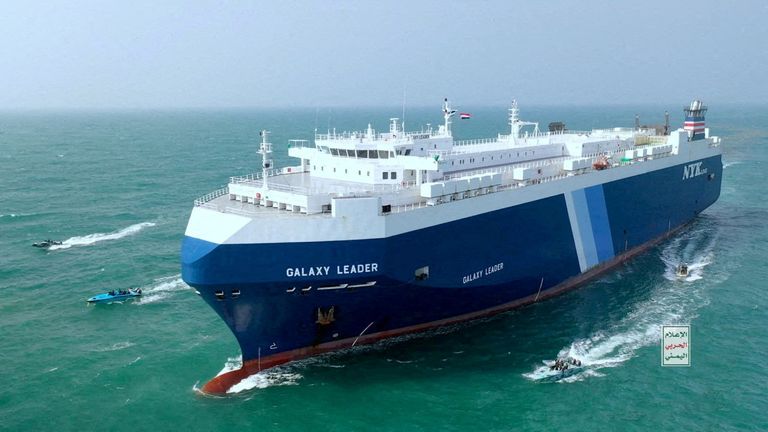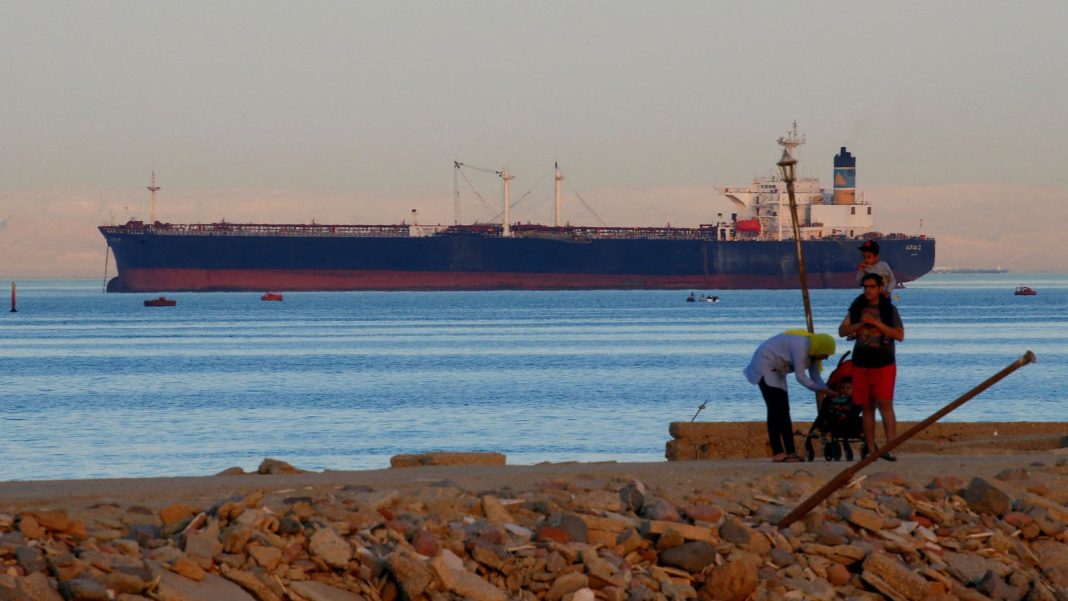Let’s start with the most important thing.
So far, the global shipping system seems to be taking the effective closure of the Red Sea more or less in its stride.
While ministries around Europe fret about the impact on oil prices, crude remains lower in cost than it was a few months ago.
It may feel like the world is in chaos, but in pure economic terms, the impact of the awful events in the Middle East has been muted.
But there’s no doubting there has been an impact.
Middle East crisis – latest: Missile ‘fired at ship’ near Yemen
Look at the flow of shipping through the Bab el Mandeb Strait – the southern gateway to the Red Sea, and it had already halved as of last week.
It’s almost certainly fallen further since then.
Look at the cost of shipping items from one side of the world to the other – indices such as the Shanghai Containerised Freight Index – and they have risen very sharply in recent weeks.
And for any ship sailing to Europe via the Cape of Good Hope, all the way around Africa, instead of up the Red Sea and through the Suez Canal, journey times are up from around 25 days to 34 days.
That doesn’t just mean freight takes longer: it costs more in fuel and other expenses, entails more carbon emissions, and means each ship can carry less freight over a given period.
The wheels of global commerce are impeded.
Read more from Sky News:
How UK military tactics against Houthis have parallels with WWII
Analysis: Iran-backed Houthis are no longer a rag-tag army
Why have the UK and US launched strikes on Yemen?
We’re already seeing anecdotal stories about how this is affecting companies.
Tesla announced that it had downed tools at its Berlin gigafactory, amid difficulties in getting supplies and components from Asia.

Tesla has suspended production at its factory in Berlin, Germany. Pic: AP
But here’s the thing: so far, the impact on prices, on the movement of goods and more broadly on the global economy has been far less dramatic than back in March 2021, when the Ever Given, an enormous freight ship, got itself wedged in the Suez Canal, blocking traffic through the Red Sea.
In part, this is because that episode coincided with the post-COVID surge in goods around the world. It came with supply chains already extremely frayed.
Please use Chrome browser for a more accessible video player

2:43
Minister: Strikes on Houthis were in ‘self-defence’
This time around, there are more ships in the water, there’s less demand for goods, and the global shipping system’s ability to withstand the impact seems, so far at least, to be greater.
The other key metric is oil prices, which are also still staying low.
That’s perhaps even more surprising, given they are affected not just by trade disruption, but by the fact that so much oil is produced in the Middle East, where much of the violence is occurring.

The Houthis took control of the Galaxy Leader cargo ship during an attack in November
The upshot is that while, all else equal, this episode would certainly push up prices, the impact may not be all that obvious.
After all, it comes as the rate of price increases drops down from those peaks last year.
There are strong disinflationary forces at play, which may outweigh the inflationary forces from what we’re seeing in the Middle East.
Please use Chrome browser for a more accessible video player

0:38
US and British strikes hit Yemen
But there are some very big provisos to all of the above. We just don’t know what the future will hold.
We are living in more chaotic times than we are used to, so it’s quite plausible that another event – be it a direct entry into conflict by Iran or something else entirely unexpected – could throw a spanner in the works of the global trading system.
Anything is possible.
For the time being, though, the worst has not yet occurred. The system is still functioning.







